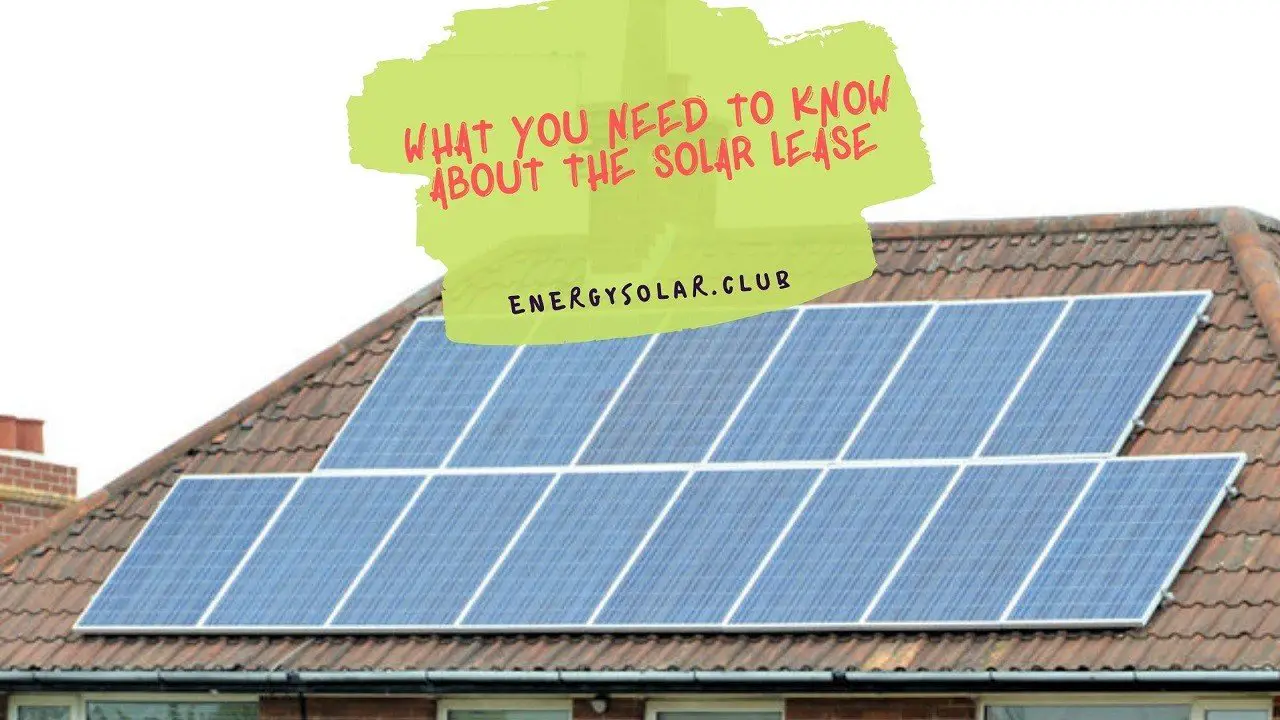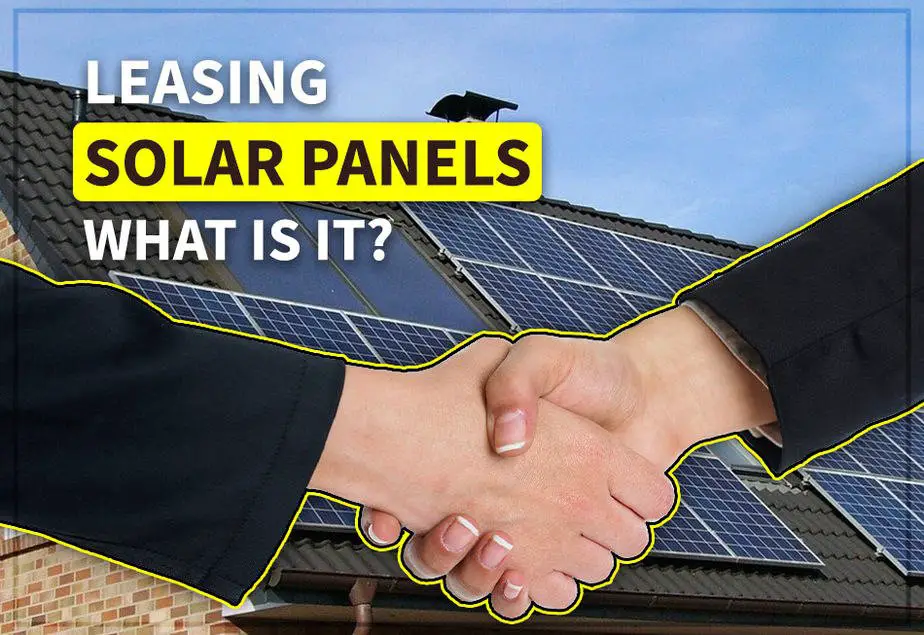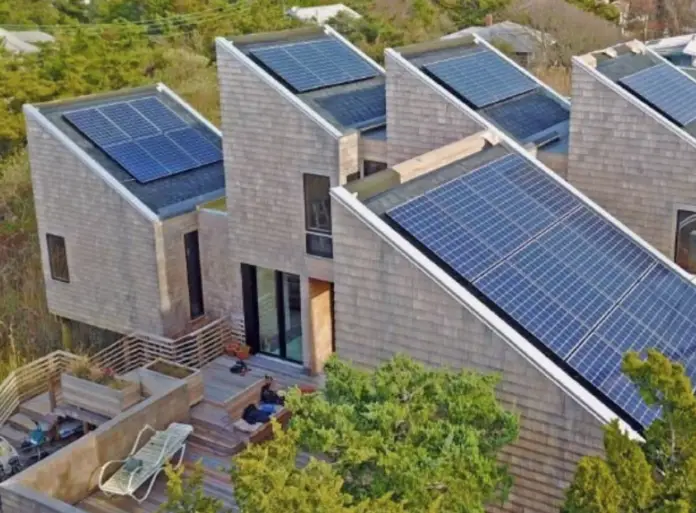What Are The Benefits Of A Solar Lease / Ppa
There are a number of potential benefits to installing a solar PV system under a solar leasing deal. The main ones are:
- The system will cost you or your business very little or nothing to install, as installation and materials costs are covered by the financier.
- Insulation against rising electricity prices. Power prices have skyrocketed across Australia over the past few years, and it is highly unlikely that they will fall again anytime soon.
- Solar system maintenance is the responsibility of the financier not you. Since you do not own the system, you do not have to pay for repairsand the company will not charge you for down-time.
- Know where your power is coming from and that its clean. Unless you purchase GreenPower, the power you purchase from the grid comes largely from coal and gas plants.
How Is A Solar Lease Different From A Solar Ppa
Solar leases are similar to solar power purchase agreements . With both options, you do not own the solar panels on your home, but can benefit from lower energy costs and clean power.
The main difference between solar leases and PPAs is in how you are charged. With a solar lease, the rate you pay each month remains the same, no matter how much energy the solar panels generate. Solar PPAs outline a price per kWh of solar produced in the contract. This means youll be charged more if your solar panels produce more energy or less during a low-production month.
Solar Farm Land Lease Rates
In the right locations, solar is one of the most profitable uses of rural land. However, pinning down an exact figure of what land should rent for can be a challenge for landowners because of the wide range of data found on the Internet. The truth is that the United States is expansive with complex markets for power and so a straightforward answer of $300 to $2,000 per acre per year can be misleading without context.
Before getting into rental rates, its first important to understand the metrics common for calculating rent in solar land transactions and some high-level factors that impact the market. Royalty structures where the landowner shares in a percentage of project revenue are common in upstream oil & gas leases however, solar energy production should be predictable and consistent over time. Therefore, contractually fixed rental rates on a per acre basis are the most common structure for solar farm land leases. This is a good thing for landowners as it makes the job of projecting lease revenue much simpler. Since utility-scale solar leases have terms from anywhere between 15 and 50 years , built in annual rent escalation is the standard. Rates should be near estimates of future inflation with average figures between 1.5% to 2.5% annually. Starting rent amounts per acre both pre-construction and post-construction vary widely by project size, land values and regional supply and demand of solar sites.
Don’t Miss: When Can You Give A Baby Solid Food
What Is The Difference Between Solar Panel Leasing And Power Purchase Agreement
Many solar enthusiasts looking to use solar energy and reduce their electricity bills have heard of the Power Purchase Agreement and solar panel leasing. Some make the mistake of thinking that they are interchangeable terms, but this is not the case. Both of them are different schemes, although they have in common that there is no high upfront investment for the PV system.
As aforementioned, solar panel leasing means the company owns the PV system and they charge you a monthly fee for having the right to use the energy produced by the modules. Under this scheme, you get to enjoy all of the generated energy for that fixed tariff, disregarding how well or poorly the PV system performs.
Power Purchase Agreement is only similar in the fact that you also do not have to worry about paying for the solar panel cost or installation, nor own the PV system. The main difference is that with a PPA you will be paying the company for the solar energy that the system produces, and you only have to pay your electric utility if you consume more power than what the PV system produces.
Solar Panel Leasing Cons

- Depending on where you live and the number of sunny days actually available to generate solar power, you may need to subsidize your solar power with another energy source, like electrically. In instances such as these you will find yourself with two bills that must be covered.
- Solar leasing does not add any value to your home, mainly because the leased panels do not remain with the home upon sale. Its also important to keep in mind that leased solar panels may make selling a home more difficult if potential homebuyers dont care to use solar panels and need to explore other home energy options.
- Solar panels are cheaper than electricity and other power sources, but leasing panels does not afford the same long-term savings as buying solar panels outright. Also, there are no tax breaks or incentives offered by the local or state government that comes with leasing. Any tax breaks offered go to the solar developer, not the homeowner.
You May Like: How Does Vivint Solar Make Money
How Solar Leases Work: Everything You Need To Know
Our posts may contain links from our affiliate partners. This supports helps support the site as we donate 10% of all profits to sustainability organizations that align with our values. However, this does not influence our opinions or ratings. Please read our Terms and Conditions for more information.
Solar leases are ideal for individuals who wish to enjoy the maximum solar energy supply while at the same time minding the cost.
Solar leases work to create convenience for solar owners who are not in a position to install solar panel systems on their roofs. Solar installation was very costly in the past, making it nearly impossible for individuals to own.
To enjoy these solar lease opportunities, you should understand how solar leases work, the cost of leasing solar, and how solar panel leases work.
Is A Solar Lease Right For Me
Along with solar loans, solar leases are among the most popular financial options to go solar. Who should consider a solar lease? Who is a solar lease most appropriate for?
- Homeowners who want to go solar as quickly as possible.
- Homeowners who dont want to worry about the possibility of needing to replace an inverter or other parts of their system.
Also Check: What Is The Tax Credit For Solar
Paying For Solar Panels In Cash
Using cash as the mode of payment increases your long-term savings. Cash purchases come with many advantages like saving your utility bills and protection from inflation and interests.
However, it also has its downfalls, like the upfront costs being very high, which is not affordable to every homeowner.
What Are The Terms Of A Solar Lease
Each solar lease contract is different, but the basic terms tend to be similar.
Solar lease term lengths are usually between 20 and 25 years, which is about the lifespan of solar panels. The solar developer will usually offer a solar monitoring program for your smartphone or online so you can track how your solar panels are performing. You can learn more about various solar monitoring programs here.
The developer will also be monitoring your system to ensure that it is working properly. If there are any issues with your solar panel systems performance, the solar company is responsible for repairs at no cost to you.
Solar lease contracts will include a price escalator to reflect the increase in the cost of electricity, which means your lease payment will go up each year. The escalator will usually be between 1% and 5%
And if youre thinking of moving, most solar companies will allow you to transfer the lease to the new homeowners, or you can break the lease and remove the panels. At the end of your contract, you can either renew the lease, have the panels removed, or purchase the panels at fair market value or at a price that is already outlined in the contract.
Also Check: Do You Need An Ein For Sole Proprietorship
Solar Leases Can Prevent Any Other Use Of The Property
In Texas, it is common to see a tractor farming around oil pump jacks or cattle grazing beneath wind turbines. Because of the way oil, gas, and wind production occurs, the surface owner can make agricultural uses of the property even while oil, gas, or wind leases exist.
The same is not always true for solar leases. Often, a solar farm requires many continuously placed panels that prevent other uses of the surface of the land. When evaluating solar leases, assume that the lease payment will be the only income you will receive for the property and negotiate accordingly.
Transfer Of A Solar Lease
Alternatively, you may consider transferring the lease to a new homeowner so that you can get out of the solar contract. So how do you do this? Several solar companies have a service transfer specialist who will assist you throughout the entire procedure of ensuring your lease is passed on to the new homeowner.
Regardless, some buyers are always reluctant to accept this solution. But, the good news is that you can minimize the selling price of the property by the amount of the transfer and wrap up the sale.
On the whole, you might want to look at a buyout first if you have plans of selling your residence soon. If you have the potentiality of a quick buyout, you can settle your lease and possess the solar panel system yourself. See why it is a good option to spend more and own the solar panel? It will save you the trouble when you need change.
In addition, if you own solar panels, your home value goes up which is an advantage for you while selling. Normally, people are looking to purchase homes that have already installed solar panels to avoid the hustle of self-installation.
Meanwhile, if the amount of buyout is considerably less expensive compared to the lease periods monthly payments, its an economically acceptable option to opt for.
Don’t Miss: Is Solar Good For My House
How To Get Out Of A Solar Lease Contract
Are you confused about how to get out of a solar lease after the installation process?
Most homeowners with solar systems installed over five years ago secured them on lease. This was done due to the lack of proper financing options available in the market. Today, we are enjoying the option to buy solar panels in cash or loan and still enjoy the numerous benefits that come with it. Whether to buy or lease solar is in the hands of the buyer. Before we go further, you may wonder:
Is It Better To Buy Or Lease Solar Panels

There are three ways to purchase solar panels: cash, solar loans and solar leasing, otherwise known as a power purchase agreement . The best way for you to switch to clean renewable energy depends on your particular needs and financial goals.
Here is a quick overview of leasing vs. buying solar panels:
The financial benefits of buying a home solar energy system with full cash upfront include:
- Higher long-term savings for homeowners.
- Monthly energy bill savings from the first month, with no monthly payment to offset the savings.
The benefits of financing your solar panels with a loan include:
- Low upfront cost depending on type of loan .
- Significant long-term savings.
- Monthly utility bill savings, offset by a monthly loan payment.
- Loan payment will get paid down and eventually disappear.
The benefits of solar leasing or solar purchase agreements include:
- Lower upfront cost than purchasing with cash.
- Maintenance for the solar system will be the responsibility of the leasing company.
- Monthly electricity bill savings but a higher monthly payment for lease that will offset the savings.
Recommended Reading: What Is A Solar Charger
Will My Home Or Business Benefit From A Solar Leasing Deal
Since feed-in tariff incentives which pay solar system owners a generous rate to export their power to the electricity grid have been scaled back in most states, solar systems most benefit those homes and businesses who can consume their solar power as it is being generated .
The rule of thumb these days for both those who are considering buying a system as well as those considering a solar lease is this: If you do not use much electricity during the day, or cannot shift more of your usage to daylight hours, solar panels may not be a realistic money-saving option for you. In particular, solar leasing deals tend to save the most money for those who consume a higher-than-average amount of electricity and whose quarterly bills are around or above $1,000.
Trust In Our Comprehensive Solar Plans
Concierge Service
From drafting your final blueprint to filing paperwork and securing permits, you can count on us to provide the professional support you need.
All Inclusive Protection
All inclusive protection gives you the ease of mind and eliminates the need to spend out of pocket.
System Monitoring
Enjoy personal system monitoring with Momentum Solars App for your newly installed solar panel system without any hassle or spending out of pocket.
Read Also: What Are The Government Incentives For Solar
Also Check: How Much Is Solar Panel Cleaning
Solar Leasing Vs Solar Loans
Solar leases and solar loans are also similar in many ways. They both involve no or minimal money needed upfront and have monthly payments, but they key difference is ownership: with a solar lease, you dont personally own your solar panels, while with a solar loan setup, you do own your panels.
This is important for a few reasons. First, owning your panels with a solar loan setup means that you can take advantage of rebates and incentives upon installation. With a solar lease, the owner of the system is the solar company, so they receive the financial incentives instead. For this reason , lifetime savings with a solar loan are usually higher than those with a solar lease.
Second, if you choose a solar lease or PPA, the leasing company owns the PV system and typically will offer a service program to cover any maintenance issues that arise during the lease term. If you take out a solar loan to purchase your PV system, you will be responsible for its maintenance.
Lastly, monthly payments differ slightly between leases and loans. In a loan agreement, you usually have a fixed monthly payment due. With solar leases, payments typically increase over time (usually around one to three percent annually.
Read more about solar leases vs. solar loans in this article.
If The System Was Acquired Through A Solar Lease Then You Might Be Required To Take Over The Monthly Payments
Solar leases are quite common, as they allow homeowners who do not have the necessary upfront cash to purchase a system outright to still take advantage of the benefits of solar power. There are four types of solar financing options: leases, power purchase agreements , private loans, and PACE financed systems.
You May Like: How To Register As A Sole Proprietor In Florida
Who Are Solar Loans For
Solar loans are the least expensive form of borrowing for homeowners who have good credit scores. Home equity loans are the cheapest type of solar loan since they have the lowest interest rates and the interest paid is actually tax deductible, just like mortgage interest. Other non-collateral solar loans have higher interest rates but may require no money down and may also be paid off early with no penalty which is not true for leases.
Can Scare Off Potential Home Buyers
Once you enter into an agreement with a leasing company, you will have to involve them in the decision-making process if you decide to sell your house before the lease is up.
In most cases, you will have to buy the lease out to make it easier to sell your home, or the person interested in buying the home will have to assume the lease. Some potential buyers will be reluctant to assume the lease, which can increase the amount of time it takes to sell your home.
Recommended Reading: How Does Going Solar Work
If You Sell Your Home You Can Transfer Your Lease To The Buyer
Whether you buy or lease solar panels, you are in it for the long run. With the average duration of a solar leasing contract nearing 20 years, there is a possibility that you will sell your house before the contract ends. In that case, you will be able to transfer your lease to the new buyer. Alternatively, some solar companies might offer to relocate your panels to your new home, if its able to accommodate the system.
Solar Panel Leasing Vs Solar Loans

When it comes to solar panel financing, the main question that homeowners have to ask themselves is whether they want to go with a solar lease or a solar loan. Both forms of financing are right for homeowners in different situations, and have their pros and cons, so homeowners should educate themselves on what both entail before making a decision. Let’s take a look at the core differences between the two financing types, and the homeowners that each is right for.
You May Like: How To Install The Ring Solar Panel
